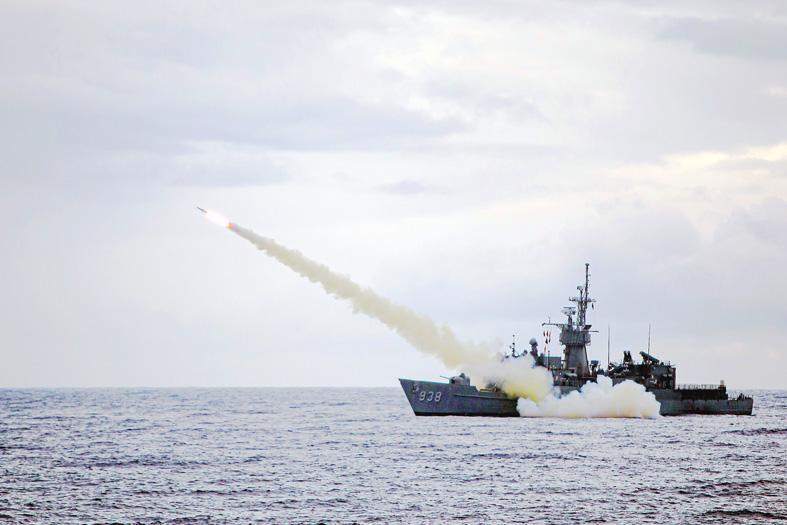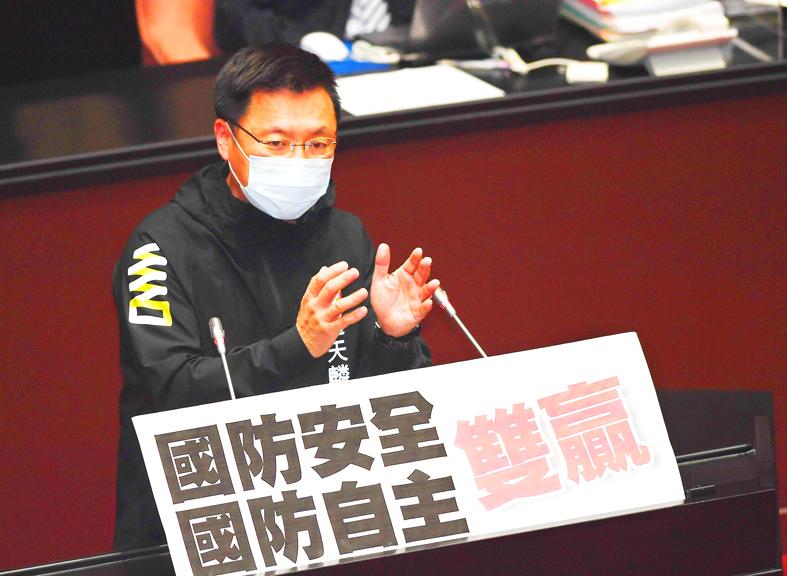The Legislative Yuan yesterday approved a bill authorizing the government to draft a special budget of up to NT$240 billion (US$8.63 billion) for arms procurements over the next five years.
The new law allows the government to use a special budget — which is not subject to the spending constraints of the normal budgeting process — to acquire mostly indigenous weapons to upgrade the nation’s anti-air and anti-surface capabilities.
The Executive Yuan would soon write a special budget based on the new law and submit it for review to lawmakers, said Democratic Progressive Party (DPP) Legislator Chao Tien-lin (趙天麟), a convener of the legislature’s Foreign Affairs and National Defense Committee.

Photo courtesy of the Ministry of National Defense via CNA
Premier Su Tseng-chang (蘇貞昌) would then attend a hearing held by the Legislative Yuan to elaborate on the special budget and answer questions about it, Chao said.
Under the new law, the Ministry of National Defense would submit a written report to the legislature every May on the progress made in the previous year and the spending plan for the following year.
Eight types of weapon systems can be purchased under the special budget: shore-based anti-ship missiles, field and ground-based air defense systems, uncrewed aerial vehicles, air-to-ground and surface-to-surface cruise missile systems, high-performance submarines and weapon systems for the coast guard.

Photo: CNA
The production of the Taiwan-made Tien Kung (Sky Bow), Tien Chien (Sky Sword) and Hsiung Feng (Brave Wind) series of missiles would be supported by the budget, the ministry said.
When the Executive Yuan proposed the bill in September, Su said it was part of the effort to safeguard national sovereignty and security, as China continues to engage in military exercises near Taiwan.

Seventy percent of middle and elementary schools now conduct English classes entirely in English, the Ministry of Education said, as it encourages schools nationwide to adopt this practice Minister of Education (MOE) Cheng Ying-yao (鄭英耀) is scheduled to present a report on the government’s bilingual education policy to the Legislative Yuan’s Education and Culture Committee today. The report would outline strategies aimed at expanding access to education, reducing regional disparities and improving talent cultivation. Implementation of bilingual education policies has varied across local governments, occasionally drawing public criticism. For example, some schools have required teachers of non-English subjects to pass English proficiency

‘FORM OF PROTEST’: The German Institute Taipei said it was ‘shocked’ to see Nazi symbolism used in connection with political aims as it condemned the incident Sung Chien-liang (宋建樑), who led efforts to recall Democratic Progressive Party (DPP) Legislator Lee Kun-cheng (李坤城), was released on bail of NT$80,000 yesterday amid an outcry over a Nazi armband he wore to questioning the night before. Sung arrived at the New Taipei City District Prosecutors’ Office for questioning in a recall petition forgery case on Tuesday night wearing a red armband bearing a swastika, carrying a copy of Adolf Hitler’s Mein Kampf and giving a Nazi salute. Sung left the building at 1:15am without the armband and apparently covering the book with a coat. This is a serious international scandal and Chinese

PERSONAL DATA: The implicated KMT members allegedly compiled their petitions by copying names from party lists without the consent of the people concerned Judicial authorities searched six locations yesterday and questioned six people, including one elderly Chinese Nationalist Party (KMT) member and five KMT Youth League associates, about alleged signature forgery and fraud relating to their recall efforts against two Democratic Progressive Party (DPP) legislators. After launching a probe into alleged signature forgery and related fraud in the KMT’s recall effort, prosecutors received a number of complaints, including about one petition that had 1,748 signatures of voters whose family members said they had already passed away, and also voters who said they did not approve the use of their name, Taipei Deputy Chief Prosecutor

TRADE: The premier pledged safeguards on ‘Made in Taiwan’ labeling, anti-dumping measures and stricter export controls to strengthen its position in trade talks Products labeled “made in Taiwan” must be genuinely made in Taiwan, Premier Cho Jung-tai (卓榮泰) said yesterday, vowing to enforce strict safeguards against “origin laundering” and initiate anti-dumping investigations to prevent China dumping its products in Taiwan. Cho made the remarks in a discussion session with representatives from industries in Kaohsiung. In response to the US government’s recent announcement of “reciprocal” tariffs on its trading partners, President William Lai (賴清德) and Cho last week began a series of consultations with industry leaders nationwide to gather feedback and address concerns. Taiwanese and US officials held a videoconference on Friday evening to discuss the